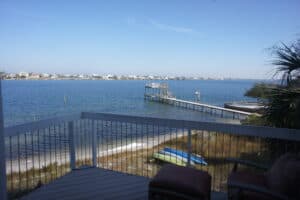
Burning Sunshine
by Fred Garth
If nothing else, history is sprinkled with irony.
How’s this? A Texas businessman makes his fortune in the oil and gas industry and then goes on to build one of the most advanced solar energy systems on the planet.
Regardless of your views on global warming or even if you think aliens live among us, one thing is certain—solar power has become good business. This is especially true in remote tropical outposts where big fish roam, and electricity is produced by burning expensive diesel fuel.
“We were going through 1,000 gallons of diesel fuel every day to power our resort,” said David Renaud, general manager of Chub Cay Resort in the Bahamas. “At $5 to $6 per gallon, that’s a massive expense.”
Chub Cay is your typical postcard-perfect, blue water beach paradise. The five-mile-long island anchors the south end of the Berry Island chain and sits about 20 miles north of Andros. Chub is famous in the fishing world for being adjacent to the Tongue of the Ocean and on the doorstep of The Pocket, a deep-water geological formation that is home to an incredibly diverse lineup of sea critters, including marlin, dorado, tuna, sailfish, sharks…you name it. Also, the sunshine is intense.
The resort is a longtime favorite hangout of the rich and famous. Yet, it has gone through numerous owners and iterations since the 1970s. In 2014, George Bishop (that aforementioned businessman) bought the entire island. In some ways, he inherited a beautiful nightmare.
“The resort had been languishing in receivership, so it was basically in a state of disrepair,” Renaud said. “We were facing myriad problems, and on top of everything, we couldn’t even get vegetables to grow in our garden. That was kind of depressing.”
In addition to getting the resort into ship-shape, part of Renaud’s mission was to investigate alternative forms of energy, such as wind and solar power. Not only was diesel a crippling expense, but just keeping the massive generators running was a royal pain. There was the engine oil and filters that had to be changed regularly and disposed of safely, and the constant threat of mechanical failures and getting parts shipped to such a remote location. Just off-loading all of that diesel fuel from the boat to the dock to the generator took excessive manpower and time. Pile on the carbon monoxide fumes spewing into the atmosphere 24/7, and it all seems a bit archaic.
Renaud and his team spent an entire year researching alternative fuel options. After many hours and stacks of spreadsheets, he eventually landed on a plan to build a solar farm that could provide power to the entire island. The cost for the microgrid: $12 million. That sounds like a lot of money until you consider the fuel and labor savings. Renaud predicts they will recover that investment in four-to-five years. Resort owners smile at sound money management like that.
In 2021, the project was built on eight acres of unused land with 7,600 bi-facial panels that can absorb sunlight on both sides. Even light reflecting off the ground gets sucked into the system. The crown jewel is a $2 million bank of lithium-ion batteries that provides 10 megawatt-hours of storage. The 13.8 Kilobyte system pumps out enough energy for the 104 local residents (in a 64-home staff village) as well as 180 hotel rooms, 70 private homes, and the 110-boat slip marina.
“We had a number of different companies bidding on the project,” Renaud said. “Ultimately, we went with a Bahamian company because we wanted to employ a local business and local people. To build the project, the work force was 90-95% Bahamians. Now, the solar facility is providing high-tech jobs for a lot of local people who can use those skills in the future.”
These days, it’s fairly common for resorts in far-flung corners of the world to employ solar and/or wind. In this case, Renaud and the system designers changed the game around somewhat. Instead of just sending the solar energy into the batteries to run everything, their microgrid powered up the island’s grid.
“It makes more sense to send power to the grid during the day when the sun is churning out energy,” Renaud said. “When we have excess energy, that is, when we are producing more power than is being used at that moment, that electricity feeds into the batteries.”
When the sun sets and the panels shut down, the island runs off the battery system. The diesel generators kick in as a backup if the battery gets low. The generators may sit dormant for several days or run a few hours per day, depending on a variety of factors such as cloud cover or overall electricity usage. The bottom line is that diesel fuel consumption has dropped by 90%, which translates into more than $1.5 million per year in fuel savings and dramatically less carbon dioxide in the atmosphere.
“The beautiful part is that the system is totally automated,” Renaud said. “The software manages the grid for us, so it’s totally hands-off. The technology is borderline Star Wars. Plus, there’s tremendous interest from the Bahamian government, which is studying the microgrid to copy on other islands.”
The initiative won the North and South American Solar Project of the Year partly because of the innovative way they configured the solar panel-grid-battery relationship. In addition to powering the whole island, the setup also has the potential to triple the life of the batteries from a typical five years to as many as 15 years. With the major expense of the battery bank, that’s a game changer.
“If we can get that extended life out of the battery, it brings our cost to as low as five-to-seven cents per kilowatt hour.” (It costs about 40 cents per kilowatt hour to produce electricity using diesel-powered generators.) “The reduced cost of electricity allows us to sell that power to our customers for a fair price.”
Wait, what? Did he say “sell?”
Yes, he did. The Chub Cay Resort is no longer just a beach playground and marina. Now, it’s also a utility company—a green utility, that is. Instead of the homeowners and the yachts in the marina running on diesel-generated electricity, they’re running on sunlight. It should be noted that the local workers who live in the staff village pay no rent or water fees and, of course, electricity is free.
“The fuel savings is amazing, but it’s really just a small part of the story,” Renaud said. ”We’ve transformed from fossil fuels to solar, which is even more impressive when you consider that Mr. Bishop has been an oil man for most of his career. Both he and the resort have changed with the times. The greatest part is that the resort wins, our customers win, the oceans wins, and the planet wins.”
The resort is blazing a path for others in the Bahamas to follow. Since most of the electricity in the island nation is still produced by diesel, it’s not uncommon for local people to pay as much as $1,000 a month for power for a modest 1,200-square-foot home. Their power bill is often higher than their rent, and families do their best to save electricity by only using their air conditioning for a couple of hours in the morning and a couple at night.
Now, on Chub Cay, at least the winds of change are blowing.
“What we’ve done is not only good for the environment,” Renaud said, “but great for our checkbook and the local islanders. We like to say that we burn sunshine on Chub.”
In case you were wondering, they’ve even gotten the garden growing.
“We were trying everything to get the vegetables to grow, and our engineer kept telling us that the water was just wet,” Renaud said. “I told him I knew that water was wet, but what did he mean?”
It turns out the reverse osmosis watermakers that desalinate seawater into drinking water were also stripping out all the minerals, so there were no nutrients to help the plants grow. As the engineer said, it was just wet. They decided to mix in some gray water from the resort, and the next thing you know, the garden took off.
“We’re growing watermelons that look like they came from Jurassic Park,” Renaud said with a chuckle. “Now our garden supplies 20% of the vegetables for the resort.”
Sidenote: Even the desalination watermakers that turn saltwater into freshwater are powered by the solar farm. “The desalination systems use a lot of electricity. Now, especially when our occupancy is low, we use the extra power to make water, which is obviously a precious resource. Our cost for water is now close to zero.”
With more than 700 islands in the Bahamas and thousands more scattered around the planet’s sun-drenched tropical belt, moving away from the era of fossil fuels is viable economically and gentle on the planet. Chub Cay has proven that it’s not the wave of the future. It’s happening right now.


